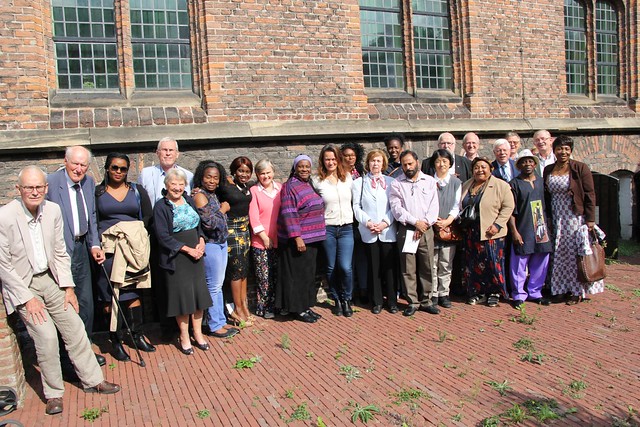Utrecht, Netherlands—“Principles and Methods to Accomplish Peace” was the topic of a meeting held by UPF-Netherlands.
About 25 people attended the meeting, which was held on August 30, 2018, in the library of Dr. Pieter Beelaerts van Blokland, a former government minister. UPF Ambassador for Peace Bart ten Broek opened the meeting by reading the Beatitudes of Jesus (Matthew 5: 1-12).
After that there was shown a video report about preparations for the next Africa Summit, which is to be held in South Africa in the beginning of 2019; UPF is working together with the Royal House of Mandela and the government of South Africa to hold this summit.
Next Dr. May-May Meijer, founder and chair of Peace SOS, introduced her organization and spoke about the theme of the meeting, focusing especially on mobilizing soft powers to accomplish peace. It is important to visualize the kind of peaceful future we want, she said. Here a picture was shown of happy children at play. Furthermore, she said, children need to be able to go to school.
Peace SOS supports local peace organizations—for example, Peace One Day in Mali. Another activity is writing articles for newspapers about how to prevent war and end wars by peaceful methods. Dr. Meijer recounted visiting peace negotiations between citizens of Israel and Palestine, which were held outside in public. A cry for peace was shown from children in Syria, who finally could have a safe haven in Turkey. The voice of children is an important factor to move people to make extra effort to reach peaceful solutions, Dr. Meijer said.
Dr. Meijer’s book Mission World Peace was scheduled to be published on September 21—International Day of Peace. In a part of this book she writes about her psychosis, how she overcame it and changed it into a zeal for peace.
The audience was quite inspired by her presentation. In particular, she was complimented about how she turned what is called an illness into a positive force dedicated to peace.
The second speaker was Mrs. Elizabeth Baatenburg de Jong, a lecturer for the Dutch chapters of UPF and Women’s Federation for World Peace, an affiliated organization. The title of her presentation was “Peace and the Process of Reconciliation: The Hope of God and Humankind Is to Build One Unified World of Peace.” In her presentation she pointed out that since the fall of the first human ancestors God has been working to restore the original ideal of humankind as one family under God.
Mrs. Baatenburg de Jong referred to Jesus’ attitude of loving one’s enemy from God’s viewpoint. She mentioned Dr. Martin Luther King Jr., who was well known for his efforts of reconciliation and who stated that we never get rid of an enemy by meeting hate with hate; we get rid of an enemy by getting rid of enmity. Another modern example of reconciliation, she said, can be seen in former South African leaders Nelson Mandela and Frederik Willem de Klerk. UPF efforts in the Middle East, particularly the Middle East Peace Initiative (MEPI), follow the same principles, she said.
In the preamble to the constitution of the United Nations Educational, Scientific and Cultural Organization (UNESCO) we can read: “Since wars begin in the minds of men, it is in the minds of men that the defenses of peace must be constructed.” Dag Hammarskjöld, a former secretary-general of the United Nations, once said, “Unless the world has a spiritual rebirth, civilization is doomed.”
Mrs. Baatenburg de Jong stated that nowadays more and more people are convinced that spiritual changes are needed, as well as more embracing efforts toward reconciliation by religious and political leaders.
She summarized the UPF Principles of Peace:
- God is the Parent of humankind.
- We must learn to live for the sake of others.
- Humans essentially are spiritual in nature.
- Marriage is a sacred institution, and the family is a school of love.
- Interreligious as well as international cooperation is essential to world peace.
For Ambassadors for Peace to be mediators, she said, it is important to show concern for and to respect the integrity of both parties as well as to gain trust from both sides by treating each fairly. Next, she said, it is necessary to guide both sides to move beyond a position of blame and accusation against the other and aim for a win-win outcome.

